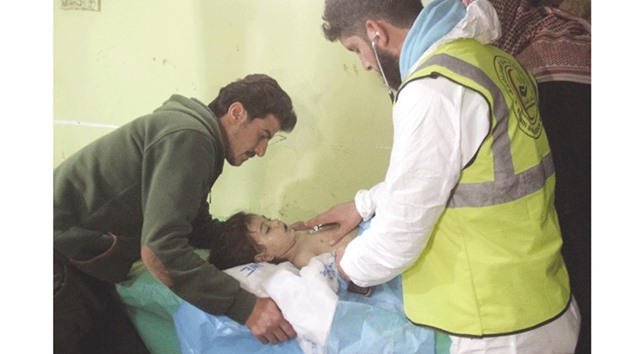The attack on the town of Khan Sheikhun killed at least 58 civilians and saw dozens suffering respiratory problems and symptoms including vomiting, fainting and foaming at the mouth, the Syrian Observatory for Human Rights monitoring group said.
Syria’s opposition blamed President Bashar al-Assad’s forces, saying the attack cast doubt on the future of peace talks.
The army denied any involvement however, issuing a statement blaming “terrorist groups” for using “chemical and toxic substances”. At least 11 children were among the dead, the Observatory said, and an AFP correspondent in Khan Sheikhun saw many attached to respirators. If confirmed, it would be one of the worst chemical attacks since the start of Syria’s civil war six years ago.
The incident brought swift international condemnation, with the United States, France and Britain all pointing the finger at Assad.
The White House condemned what it said was a “reprehensible” attack carried out by Assad’s forces.
Spokesman Sean Spicer said President Donald Trump had been briefed extensively on the incident, adding that the US was “confident in its assessment” that Damascus was to blame.
Spicer also suggested it was in the “best interest” of Syrians for Assad not to lead the country.
UN envoy Staffan de Mistura said the attack was believed to be chemical and launched from the air, adding that there should be a “clear identification of responsibilities and accountability”.
The Observatory said the attack on a residential part of Khan Sheikhun came early yesterday morning, when a warplane carried out strikes that released “toxic gas”.
As well as those killed, at least 160 people were injured, it said, and many were dying even after arriving at medical facilities.
The monitor could not confirm the nature of the gas, but said the attack was likely carried out by government warplanes.
“We heard strikes this morning...We ran inside the houses and saw whole families just dead in their beds. Children, women, old people dead in the streets,” resident Abu Mustafa said.
Russia’s military, which has been fighting in support of Assad’s government since September 2015, denied carrying out any strikes near the town.
Hours after the initial attack, air strikes also hit a hospital in the town where doctors were treating victims, the AFP correspondent said, bringing down rubble on top of medics as they worked.
He saw a young girl, a woman and two elderly people dead at a hospital.
A father carried his dead little girl, her lips blueish and her dark curls visible, wrapped in a sheet.
As doctors worked, a warplane circled overhead, striking first near the facility and then hitting it twice, inflicting severe damage and prompting nearly a dozen medical staff to flee.
Speaking to AFP, medic Hazem Shehwan said victims were suffering from symptoms including “pinpoint pupils, convulsions, foaming at the mouth and rapid pulses”.
Khan Sheikhun is in Idlib province, which is largely controlled by an alliance of rebels including former Al Qaeda affiliate Fateh al-Sham Front.
The province is regularly targeted in government and Russian air strikes, and has also been hit by the US-led coalition fighting the Islamic State group, usually targeting militants.
Syria’s leading opposition group, the National Coalition, blamed Assad for the attack and demanded the UN “open an immediate investigation” and hold those responsible to account.
“Failure to do so will be understood as a message of blessing to the regime for its actions,” it said.
Damascus officially joined the Chemical Weapons Convention and turned over its declared chemical arsenal in 2013, as part of a deal to avert US military action.That agreement came after hundreds of people — up to 1,429 according to a US intelligence report — were killed in chemical weapons strikes allegedly carried out by government troops east and southwest of Damascus.
But there have been repeated allegations of chemical weapons use since, with a UN-led investigation pointing the finger at the regime for at least three chlorine attacks in 2014 and 2015.
The army again denied using chemical weapons yesterday, insisting “it has never used them, any time, anywhere, and will not do so in the future”. The global chemical arms watchdog said it was “seriously concerned” by reports of the attack.
The Organisation for the Prohibition of Chemical Weapons (OPCW) said it was “gathering and analysing information from all available sources”.
The UN’s Commission of Inquiry for Syria said it had begun investigating the “alleged use of chemical weapons”.
More than 320,000 people have been killed in Syria since the conflict began in March 2011 with anti-government protests.
Successive rounds of peace talks, including a UN-sponsored meeting in Geneva last week, have failed to produce a political breakthrough. Yesterday’s attack cast new doubt on the peace process, said the opposition’s chief negotiator Mohamad Sabra.
“If the United Nations cannot deter the regime from carrying out such crimes, how can it achieve a process that leads to political transition in Syria?” he said
A senior Syrian security source said that opposition forces were trying to “achieve in the media what they could not achieve on the ground” by spreading images from the alleged attack site.
The UN Security Council is to hold an emergency meeting today to discuss the attack following calls from France and Britain.
“I’ve seen the reports about the use of sarin and as far as I know they have not been confirmed,” the British ambassador to the UN Matthew Rycroft said.
“This is clearly a war crime,” Rycroft told reporters. “I call on the Security Council members who have previously used their vetoes to defend the indefensible to change their course.”

